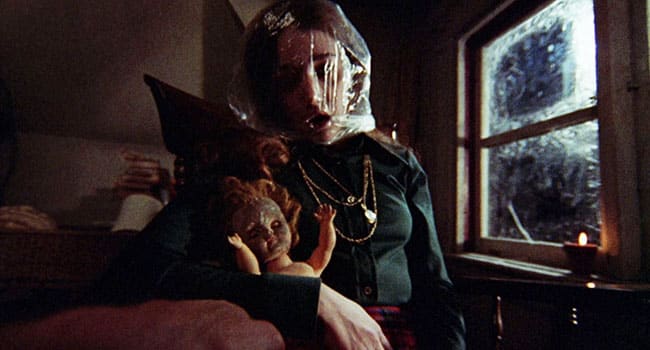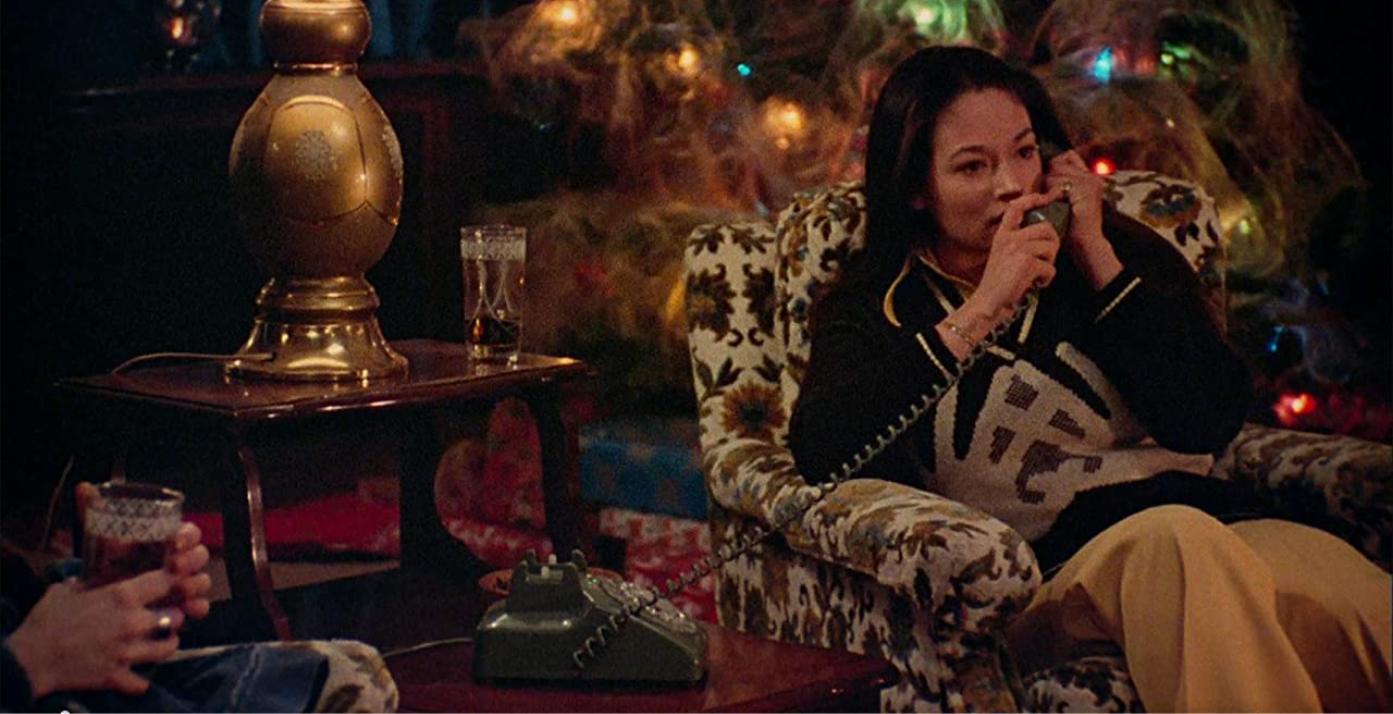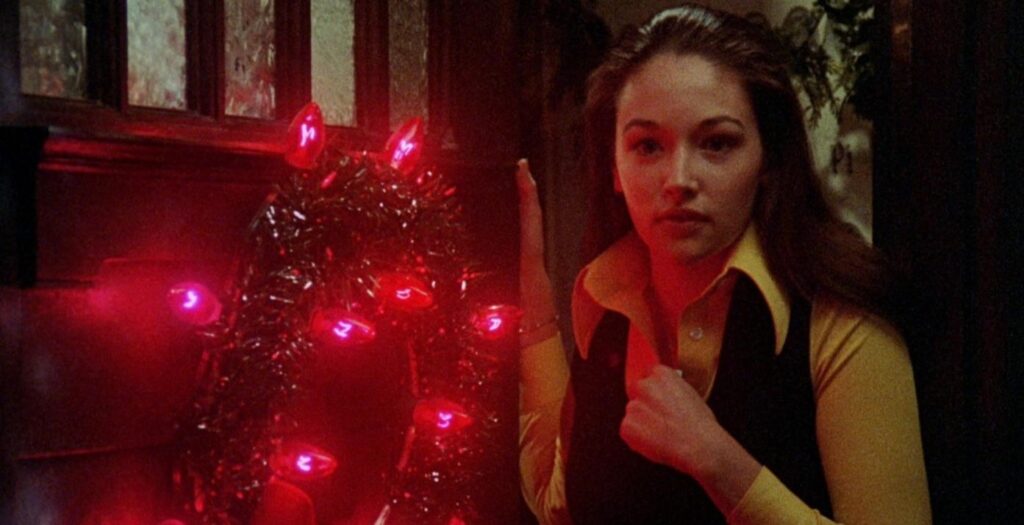Slasher movies were at their peak in the 1970s and 1980s. With final girls, eccentric kills, and very little plot, the genre expanded to the point of humor, and the terror of the horror genre soon became fun for even non-horror-going audiences. While Halloween is the film that gets the credit for jump-starting the subgenre, Black Christmas (1974) is the one that started it all and it did this with a protagonist that would be seen as a subversion of the trope she embodies. With the remake out in theaters, it’s time to revisit why the original has so much of a hold on horror even 45 years later.
In 1974 director Bob Clark and screenwriter Roy Moore brought audiences into a sorority house on Christmas Eve and terrified them. In the film, a group of sorority sisters begins to receive anonymous calls as Winter break begins. The calls are sexual, aggressive, and downright terrifying. While Barb (Margot Kidder) eggs the caller on, leading to threats, it’s clear that something is wrong.
Soon, Barb’s friend Clare (Lynne Griffin) goes missing from the sorority house, and a local teen girl is murdered in the park, leading the girls to suspect a serial killer is on the loose or, more importantly, right in their home.
Using first-person camera shots, we’re thrown into the world of a killer that we know nothing about. He stalks the house, we hear his voice through the phone, and yet, we know nothing about this violent force that walks through the house, killing the sisters. The progenitor of the “it’s coming from inside the house” on screen, Black Christmas, uses the calls to build tension. We don’t see him, but his voice, threats, and moaning are enough to make us worry.
Additionally, the film offers up some iconic kills. A unicorn horn and, of course, the plastic bag are my favorites of the film. The film uses the absurd kills to craft images that are haunting. Clare, with a bag over her head, a doll in her arm, and lifelessly being rocked by the unseen killer, is chilling even today, even when you’ve seen the film countless times.
Black Christmas is a foundational slasher film.

But while Black Christmas (1974) is a classic because it sets the foundation of the slasher subgenre, its lasting imprint on horror truly comes from its expression of agency through Jess (Olivia Hussey), our main character. While the horror of the movie goes on, Jess is struggling with her own issues, an unwanted pregnancy. Before Dirty Dancing showed the impact of a woman pushed into an unregulated abortion, Black Christmas (1974) presented the concept as normal. A choice Jess makes and sticks to despite the anger of her boyfriend.
Now, with 2019 eyes, we may look at it and think it is commonplace, but it really isn’t. Can you remember the last time you saw an abortion on television or in a film? But more specifically, have you seen a depiction that values the choice without belittling it? It’s hard, isn’t it? In 1974, it was even harder. What we see as a simple portrayal of agency, at the time, was a radical stance. Premiering a year after Roe V. Wade, Black Christmas (1974) doesn’t use abortion without thinking about its complexities, specifically that Jess faces in choosing that path.
According to the Abortion on Screen Project, 2018 was a push forward in representing the medical procedure on television, namely because as a whole, the instance discussed involved women of color, more specifically Black women. That said, this movement towards more normalization of a procedure demonized by conservatives still falters since not many of the women are talked out of receiving the procedure. But here, in 1974, we see Jess with every intention of receiving an abortion, not deterred by her boyfriend, and choosing herself, which makes the ending all the more gut-wrenching.
One of the most thoughtful pieces of Black Christmas (1974) comes from the fact that Moore and Clark acknowledge the difficulty in receiving the procedure and the opposition most women face when choosing it. While her boyfriend pushes her into motherhood, into becoming his wife, Jess pushes back.
She wants her life on her terms. She wants her dreams, and those don’t include leaving college and fulfilling his identity while letting go of her own. While some have claimed that feminist politics are not overt, it takes watching through to see that they are. The feminism may not be as loud as the barrage of Tumblr-post feminism like the most recent remake, but it is undeniably there. Feminism, or rather the need for that equality, runs throughout the film and shouldn’t be easily dismissed.
Normalizing abortion in film started in 1974, but where can it go from here?

While the normalization of abortion is enough to land Black Christmas (1974) on any feminist horror syllabus, the fact that the police are dismissive of Clare’s disappearance, chocking up to her being “shacked up with a boyfriend,” showcases that the horror women are subjected to comes from their invisibility to men in power. If not seen as daughters, as opposed to sex-crazed college students, or as children too innocent for the world, they are thrown aside. This dismissal and gaslighting in Black Christmas cause the deaths in the film following Clare’s, a note that the 2019 remake uses as well.
At the end of the night, Black Christmas is a holiday classic and a film that builds horror’s foundation for more than its kills. It is with us 45 years later because it establishes tropes and presents a realistic and authentic depiction of being a woman.
Abortion is normal, and you’ll be pressed to find a film that treats it as such. While Jess is the prototype of a final girl, to be established in Halloween with Laurie Strode, she is an important part of the horror trope’s history. A trope defined by virginity and a docile nature before erupting in violence and taking the killer on, Jess was, well, Jess. She had sex, she chose an abortion, and while we don’t know what happens, in the end, she was the final girl on her own terms, something that horror is just now finding its way back to.
While Black Christmas (2019) is written and directed by women, it isn’t the first subversive horror film that presents a feminist view of the world, nor is it the only one, regardless of what its marketing claims. Ultimately, the first final girl was steeped in agency and unapologetically a woman not to be tied to a man. That is the important legacy of Black Christmas (1974) and one that shouldn’t be so easily dismissed by fans of the remake or those who claim that the original is an “apolitical” film.
Black Christmas (1974) is currently available to stream on Shudder.







